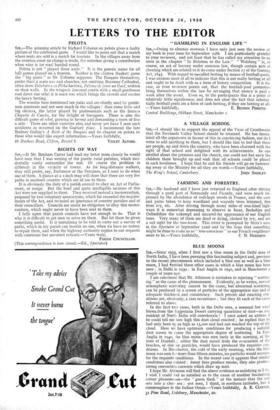BLUE MOONS
Sin,—Since 1935, when I first saw a blue moon in the Delhi area of North India, I have been pursuing this fascinating subject and, previous to the recent phenomenon which included a blue sun as well as a blue moon, I had .Verified three other cases in which a blue moon has been seen : in Delhi in 1939 ; in East Anglia in 1940, and in Manchester a couple of years ago.
I am convinced that Mr. Atkinson is mistaken in rejecting " scatter- ing " as the cause of the phenomenon. Evidently, as he writes, normal atmospheric scattering cannot be the cause, but abnormal scattering can be produced by a screen of particles of the appropriate size and of adequate thickness and consistency. Such precise and exacting con- ditions are, obviously, a rare occurrence ; but they fit each of the cases referred to above.
In the first two cases, both in the Delhi area, a seasonal hot wind blows.-from the Rajputana Desert carrying quantities of dust—as any resident of North India will corroborate I I once asked an airman if he could tell me how high this dust cloud reached ; he replied that he had only been up as high as 15,000 and had not reached the top of the cloud. Here we have optimum conditions for producing a suitable dust screen to cause the appropriate degree of scattering. In East Anglia in 194o the blue moon was seen early in the morning, at the time of .Dunkirk ; either the dust raised from the evacuation of the beaches, or else ice particles, would have produced the requisite con- ditions. In Manchester, the cold of the early morning, when the blue moon was seen for more than fifteen minutes, ice particles would account for the requisite conditions. In the recent case it appears that similar conditions also existed : forelt fires produce smoke, they also produce strong convection currents which draw up mist:
I hope Mr. Atkinson will find the above evidence as satisfying as I do. I wish I could feel as satisfied as to the cause of another fascinating colour phenomenon—the " green flash " at the instant- that the sun sets into a clear sea : not seen, I think, in northern latitudes, but a commonplace in the Indian Ocean.—Yours faithfully, A. R. CLOUGH. 31 Pint Road, Didsbury, Manchester, 20.


















 Previous page
Previous page